Benefits of Code of Ethics: Report for ASX Listed Company Shareholders
VerifiedAdded on 2023/06/03
|8
|1444
|300
Report
AI Summary
This report, written from the perspective of a corporate governance consultant, advocates for the adoption of a Code of Ethics for companies listed on the Australian Stock Exchange (ASX). It highlights the benefits of implementing such a code, including compliance with regulations like the Sarbanes-Oxley Act, enhanced marketing and public trust, risk mitigation against litigation from ethical misconduct, improved professionalism, and long-term sustainability. The report uses contemporary cases of corporate governance failure, such as Uber's ethical lapses and the Royal Commission into misconduct in the Banking, Superannuation and Financial Services Industry's 'fee for no service' scandal, to demonstrate the need for a corporate Code of Ethics. It concludes by recommending that the Chairman consider these benefits and corporate failures when deciding whether to adopt a Code of Ethics for the organization, emphasizing the importance of not just having a code, but also implementing and abiding by it.
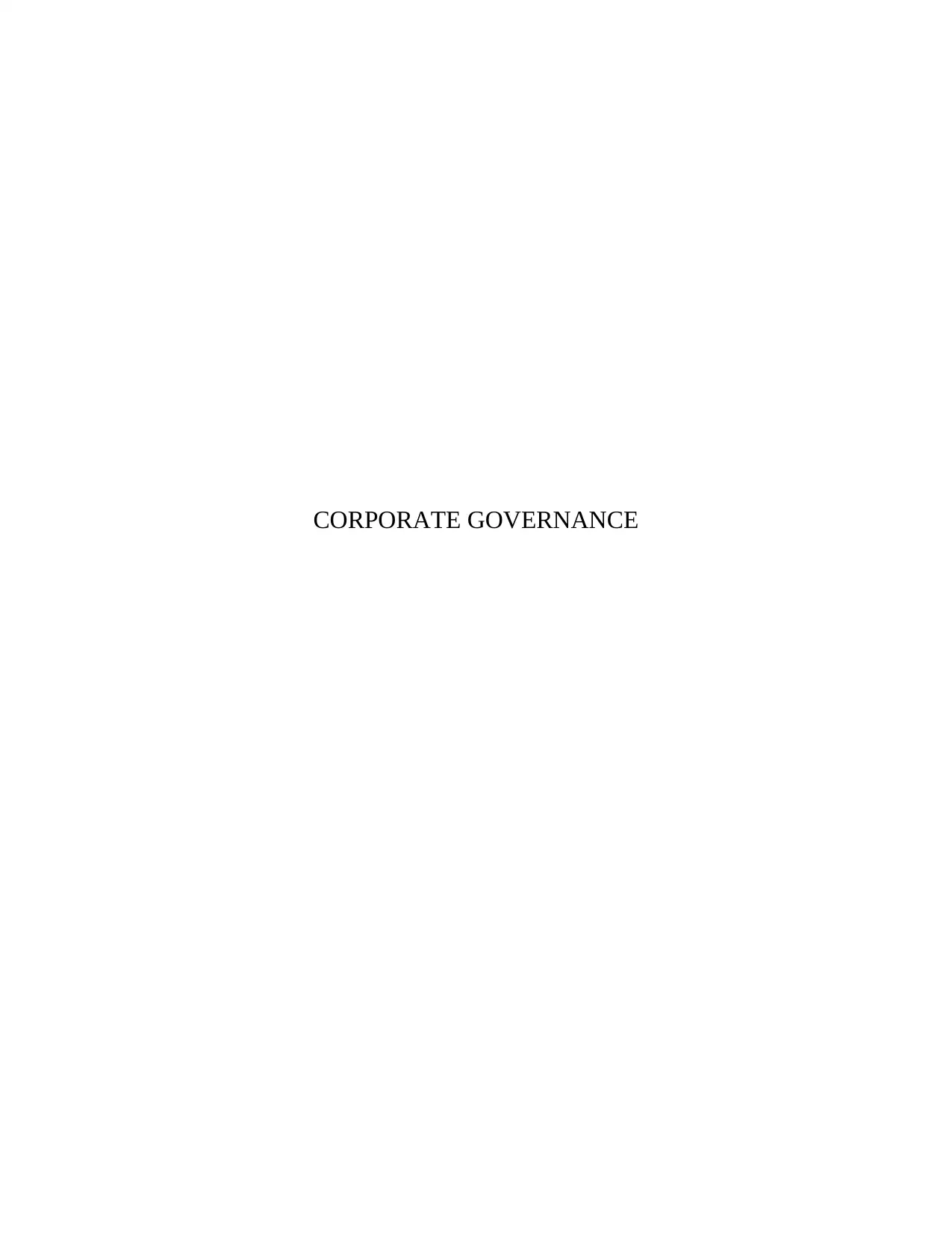
CORPORATE GOVERNANCE
Paraphrase This Document
Need a fresh take? Get an instant paraphrase of this document with our AI Paraphraser

INTRODUCTION
The Australian Psychological Society (APS) Code Of Ethics instill ethical principles that sets a
defined benchmark for guiding both the psychologists and the general public so as to develop an
understanding about being ethical while practicing profession. Basically, this code is dependent
on three ethical principles:
Respect for the rights and dignity of people: it defines the respect and dignity that a
civilized person deserves as his right and includes the right considering justice and
autonomy (Atkinson, 2012).
Propriety: This principle refers to the act of doing good with noble intentions that serves
a feeling of accountability and responsibility to clients, to professional bodies and to the
economy as a whole.
Integrity : This principle requires a professional to be in his good character as a
professional body puts its trust in all these professionals any kind of misconduct would
directly affect the image and reputation of such statute body itself (Datar, 2015).
Code of Ethics is not just an internal measure for an organization but also serves externally by
reflecting its values and commitments as a corporate towards the society. It helps in clarifying
the mission, principles and values of an organization. A well framed code of ethics defines a
required professional behavior that an entity seeks to instill in its leaders and all other employees
working under it. As a result, such ethical principles act as a benchmark against which the
performances of such entities and individuals are measured.
Actually, such a code acts as a guidance framework that instructs a professional to take decisions
and act in their professional competence. The existence of code works as a body that
professionals refer to sort out their ethical dilemmas. It is also referred to as a valuable document
adopted within a business structure (Girard, 2014).
The Australian Psychological Society (APS) Code Of Ethics instill ethical principles that sets a
defined benchmark for guiding both the psychologists and the general public so as to develop an
understanding about being ethical while practicing profession. Basically, this code is dependent
on three ethical principles:
Respect for the rights and dignity of people: it defines the respect and dignity that a
civilized person deserves as his right and includes the right considering justice and
autonomy (Atkinson, 2012).
Propriety: This principle refers to the act of doing good with noble intentions that serves
a feeling of accountability and responsibility to clients, to professional bodies and to the
economy as a whole.
Integrity : This principle requires a professional to be in his good character as a
professional body puts its trust in all these professionals any kind of misconduct would
directly affect the image and reputation of such statute body itself (Datar, 2015).
Code of Ethics is not just an internal measure for an organization but also serves externally by
reflecting its values and commitments as a corporate towards the society. It helps in clarifying
the mission, principles and values of an organization. A well framed code of ethics defines a
required professional behavior that an entity seeks to instill in its leaders and all other employees
working under it. As a result, such ethical principles act as a benchmark against which the
performances of such entities and individuals are measured.
Actually, such a code acts as a guidance framework that instructs a professional to take decisions
and act in their professional competence. The existence of code works as a body that
professionals refer to sort out their ethical dilemmas. It is also referred to as a valuable document
adopted within a business structure (Girard, 2014).
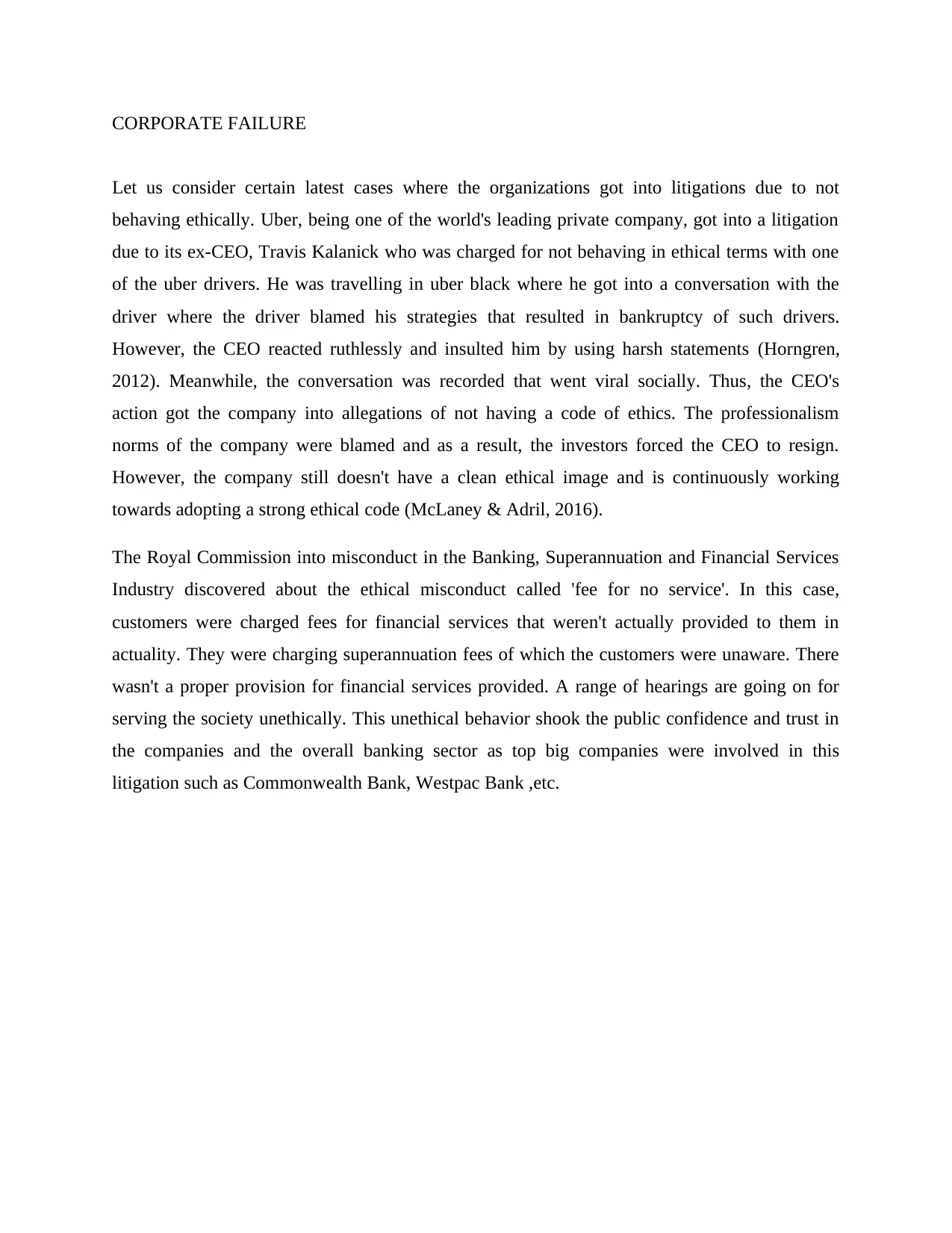
CORPORATE FAILURE
Let us consider certain latest cases where the organizations got into litigations due to not
behaving ethically. Uber, being one of the world's leading private company, got into a litigation
due to its ex-CEO, Travis Kalanick who was charged for not behaving in ethical terms with one
of the uber drivers. He was travelling in uber black where he got into a conversation with the
driver where the driver blamed his strategies that resulted in bankruptcy of such drivers.
However, the CEO reacted ruthlessly and insulted him by using harsh statements (Horngren,
2012). Meanwhile, the conversation was recorded that went viral socially. Thus, the CEO's
action got the company into allegations of not having a code of ethics. The professionalism
norms of the company were blamed and as a result, the investors forced the CEO to resign.
However, the company still doesn't have a clean ethical image and is continuously working
towards adopting a strong ethical code (McLaney & Adril, 2016).
The Royal Commission into misconduct in the Banking, Superannuation and Financial Services
Industry discovered about the ethical misconduct called 'fee for no service'. In this case,
customers were charged fees for financial services that weren't actually provided to them in
actuality. They were charging superannuation fees of which the customers were unaware. There
wasn't a proper provision for financial services provided. A range of hearings are going on for
serving the society unethically. This unethical behavior shook the public confidence and trust in
the companies and the overall banking sector as top big companies were involved in this
litigation such as Commonwealth Bank, Westpac Bank ,etc.
Let us consider certain latest cases where the organizations got into litigations due to not
behaving ethically. Uber, being one of the world's leading private company, got into a litigation
due to its ex-CEO, Travis Kalanick who was charged for not behaving in ethical terms with one
of the uber drivers. He was travelling in uber black where he got into a conversation with the
driver where the driver blamed his strategies that resulted in bankruptcy of such drivers.
However, the CEO reacted ruthlessly and insulted him by using harsh statements (Horngren,
2012). Meanwhile, the conversation was recorded that went viral socially. Thus, the CEO's
action got the company into allegations of not having a code of ethics. The professionalism
norms of the company were blamed and as a result, the investors forced the CEO to resign.
However, the company still doesn't have a clean ethical image and is continuously working
towards adopting a strong ethical code (McLaney & Adril, 2016).
The Royal Commission into misconduct in the Banking, Superannuation and Financial Services
Industry discovered about the ethical misconduct called 'fee for no service'. In this case,
customers were charged fees for financial services that weren't actually provided to them in
actuality. They were charging superannuation fees of which the customers were unaware. There
wasn't a proper provision for financial services provided. A range of hearings are going on for
serving the society unethically. This unethical behavior shook the public confidence and trust in
the companies and the overall banking sector as top big companies were involved in this
litigation such as Commonwealth Bank, Westpac Bank ,etc.
⊘ This is a preview!⊘
Do you want full access?
Subscribe today to unlock all pages.

Trusted by 1+ million students worldwide
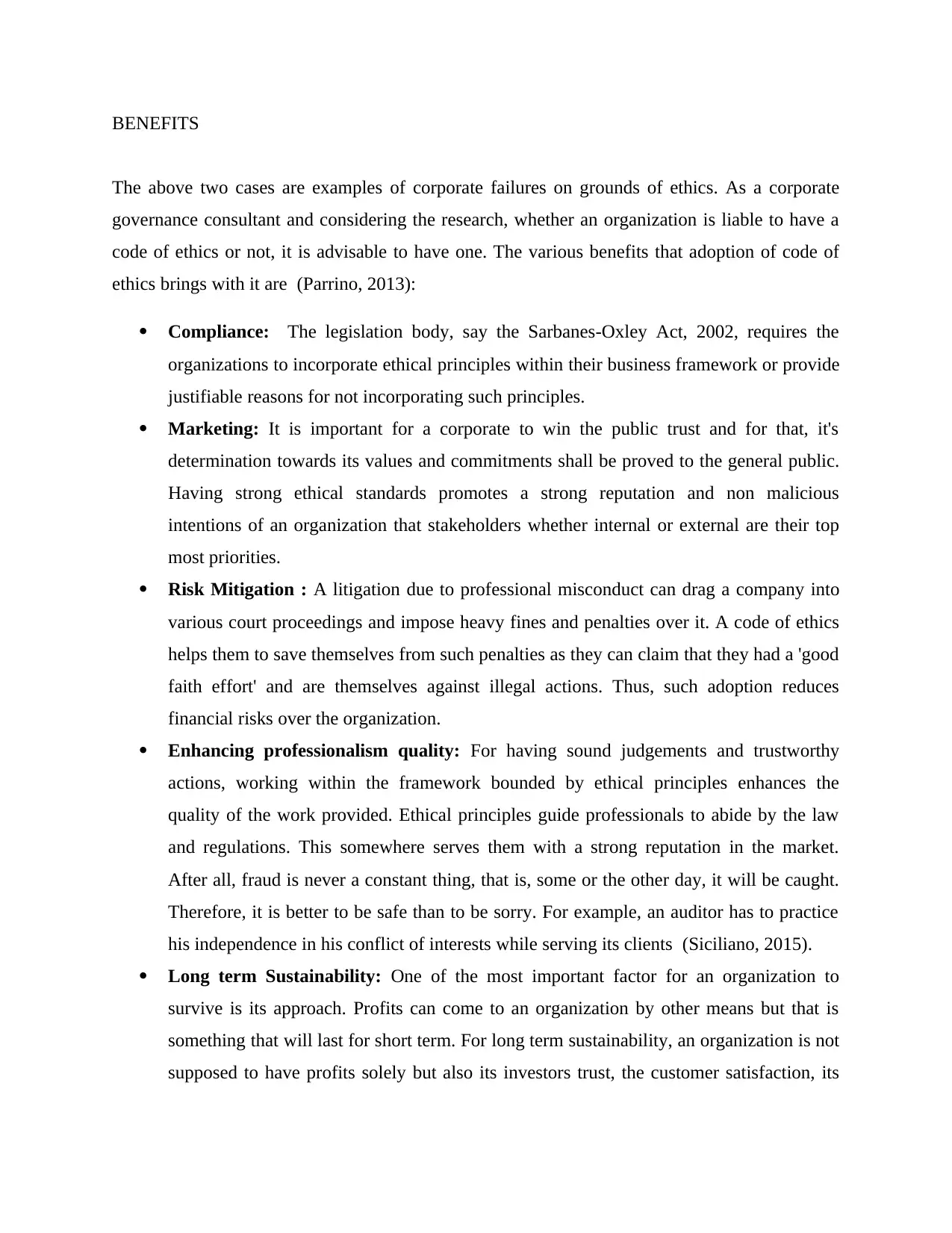
BENEFITS
The above two cases are examples of corporate failures on grounds of ethics. As a corporate
governance consultant and considering the research, whether an organization is liable to have a
code of ethics or not, it is advisable to have one. The various benefits that adoption of code of
ethics brings with it are (Parrino, 2013):
Compliance: The legislation body, say the Sarbanes-Oxley Act, 2002, requires the
organizations to incorporate ethical principles within their business framework or provide
justifiable reasons for not incorporating such principles.
Marketing: It is important for a corporate to win the public trust and for that, it's
determination towards its values and commitments shall be proved to the general public.
Having strong ethical standards promotes a strong reputation and non malicious
intentions of an organization that stakeholders whether internal or external are their top
most priorities.
Risk Mitigation : A litigation due to professional misconduct can drag a company into
various court proceedings and impose heavy fines and penalties over it. A code of ethics
helps them to save themselves from such penalties as they can claim that they had a 'good
faith effort' and are themselves against illegal actions. Thus, such adoption reduces
financial risks over the organization.
Enhancing professionalism quality: For having sound judgements and trustworthy
actions, working within the framework bounded by ethical principles enhances the
quality of the work provided. Ethical principles guide professionals to abide by the law
and regulations. This somewhere serves them with a strong reputation in the market.
After all, fraud is never a constant thing, that is, some or the other day, it will be caught.
Therefore, it is better to be safe than to be sorry. For example, an auditor has to practice
his independence in his conflict of interests while serving its clients (Siciliano, 2015).
Long term Sustainability: One of the most important factor for an organization to
survive is its approach. Profits can come to an organization by other means but that is
something that will last for short term. For long term sustainability, an organization is not
supposed to have profits solely but also its investors trust, the customer satisfaction, its
The above two cases are examples of corporate failures on grounds of ethics. As a corporate
governance consultant and considering the research, whether an organization is liable to have a
code of ethics or not, it is advisable to have one. The various benefits that adoption of code of
ethics brings with it are (Parrino, 2013):
Compliance: The legislation body, say the Sarbanes-Oxley Act, 2002, requires the
organizations to incorporate ethical principles within their business framework or provide
justifiable reasons for not incorporating such principles.
Marketing: It is important for a corporate to win the public trust and for that, it's
determination towards its values and commitments shall be proved to the general public.
Having strong ethical standards promotes a strong reputation and non malicious
intentions of an organization that stakeholders whether internal or external are their top
most priorities.
Risk Mitigation : A litigation due to professional misconduct can drag a company into
various court proceedings and impose heavy fines and penalties over it. A code of ethics
helps them to save themselves from such penalties as they can claim that they had a 'good
faith effort' and are themselves against illegal actions. Thus, such adoption reduces
financial risks over the organization.
Enhancing professionalism quality: For having sound judgements and trustworthy
actions, working within the framework bounded by ethical principles enhances the
quality of the work provided. Ethical principles guide professionals to abide by the law
and regulations. This somewhere serves them with a strong reputation in the market.
After all, fraud is never a constant thing, that is, some or the other day, it will be caught.
Therefore, it is better to be safe than to be sorry. For example, an auditor has to practice
his independence in his conflict of interests while serving its clients (Siciliano, 2015).
Long term Sustainability: One of the most important factor for an organization to
survive is its approach. Profits can come to an organization by other means but that is
something that will last for short term. For long term sustainability, an organization is not
supposed to have profits solely but also its investors trust, the customer satisfaction, its
Paraphrase This Document
Need a fresh take? Get an instant paraphrase of this document with our AI Paraphraser

employees job satisfaction, etc. Thus, all such factors comes when an organization
qualifies itself sound in terms of professional conduct, quality wise and ethically.
qualifies itself sound in terms of professional conduct, quality wise and ethically.
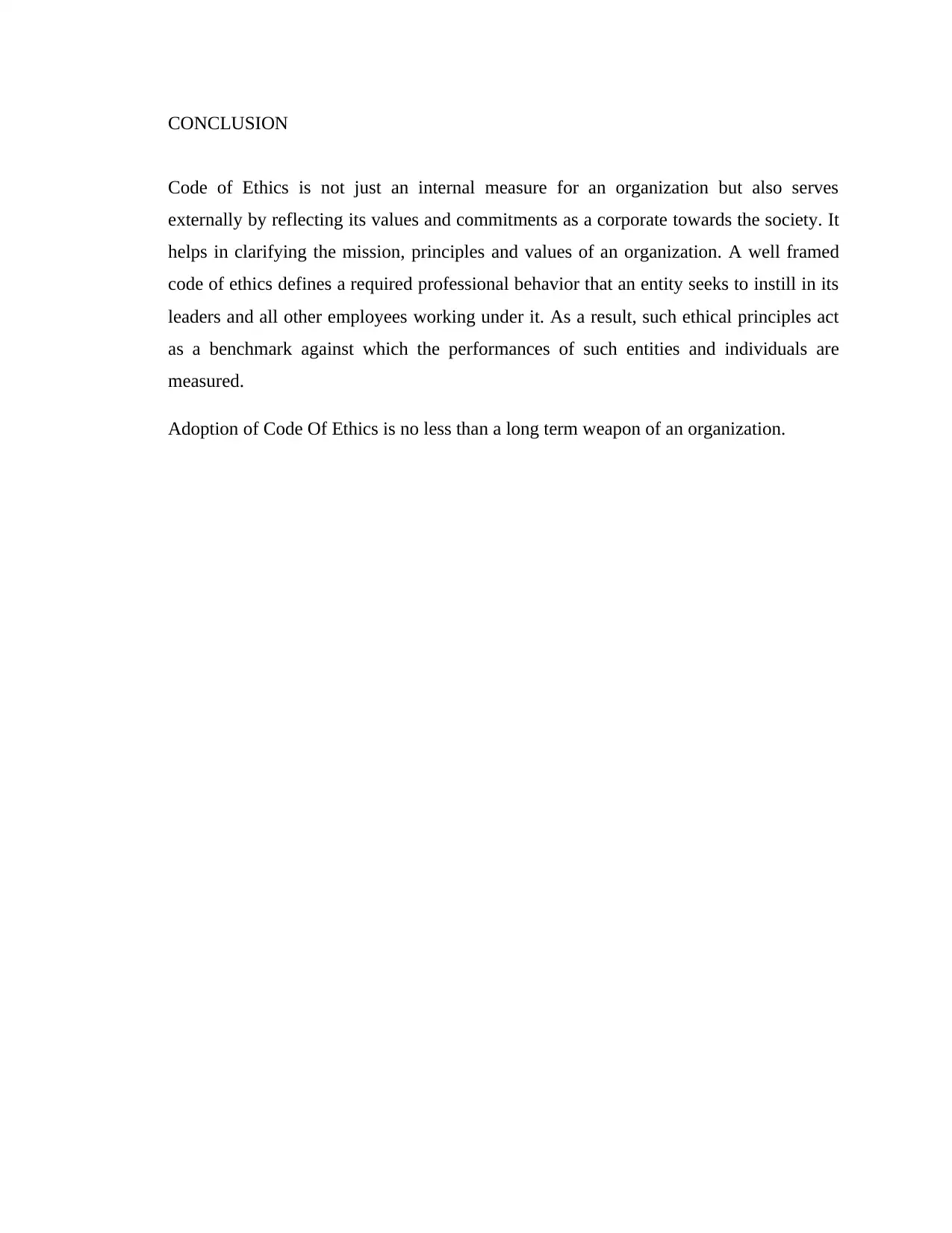
CONCLUSION
Code of Ethics is not just an internal measure for an organization but also serves
externally by reflecting its values and commitments as a corporate towards the society. It
helps in clarifying the mission, principles and values of an organization. A well framed
code of ethics defines a required professional behavior that an entity seeks to instill in its
leaders and all other employees working under it. As a result, such ethical principles act
as a benchmark against which the performances of such entities and individuals are
measured.
Adoption of Code Of Ethics is no less than a long term weapon of an organization.
Code of Ethics is not just an internal measure for an organization but also serves
externally by reflecting its values and commitments as a corporate towards the society. It
helps in clarifying the mission, principles and values of an organization. A well framed
code of ethics defines a required professional behavior that an entity seeks to instill in its
leaders and all other employees working under it. As a result, such ethical principles act
as a benchmark against which the performances of such entities and individuals are
measured.
Adoption of Code Of Ethics is no less than a long term weapon of an organization.
⊘ This is a preview!⊘
Do you want full access?
Subscribe today to unlock all pages.

Trusted by 1+ million students worldwide

RECOMMENDATION
It is not important to just have a code of ethics but it is also important to implement it and abide
by it with all the efforts. As an corporate governance consultant, considering the benefits of a
Code of Ethics, it would be better if the Chairman considers the cases of corporate failures as
well as the benefits and then, adopt a code of ethics for its organization (Taillard, 2013). It will
enhance the reputation of the organization and would prove to be a long term weapon for it.
It is not important to just have a code of ethics but it is also important to implement it and abide
by it with all the efforts. As an corporate governance consultant, considering the benefits of a
Code of Ethics, it would be better if the Chairman considers the cases of corporate failures as
well as the benefits and then, adopt a code of ethics for its organization (Taillard, 2013). It will
enhance the reputation of the organization and would prove to be a long term weapon for it.
Paraphrase This Document
Need a fresh take? Get an instant paraphrase of this document with our AI Paraphraser
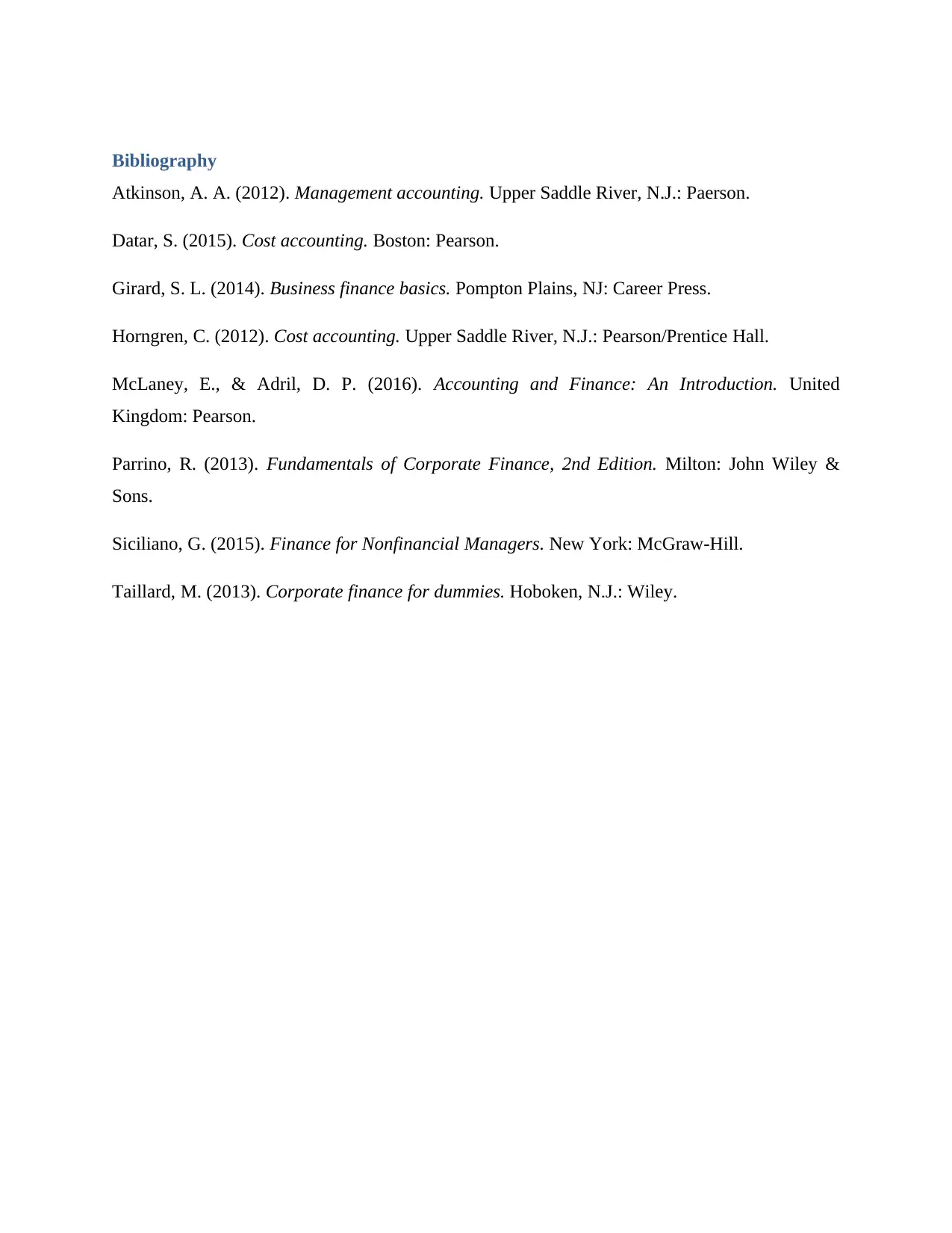
Bibliography
Atkinson, A. A. (2012). Management accounting. Upper Saddle River, N.J.: Paerson.
Datar, S. (2015). Cost accounting. Boston: Pearson.
Girard, S. L. (2014). Business finance basics. Pompton Plains, NJ: Career Press.
Horngren, C. (2012). Cost accounting. Upper Saddle River, N.J.: Pearson/Prentice Hall.
McLaney, E., & Adril, D. P. (2016). Accounting and Finance: An Introduction. United
Kingdom: Pearson.
Parrino, R. (2013). Fundamentals of Corporate Finance, 2nd Edition. Milton: John Wiley &
Sons.
Siciliano, G. (2015). Finance for Nonfinancial Managers. New York: McGraw-Hill.
Taillard, M. (2013). Corporate finance for dummies. Hoboken, N.J.: Wiley.
Atkinson, A. A. (2012). Management accounting. Upper Saddle River, N.J.: Paerson.
Datar, S. (2015). Cost accounting. Boston: Pearson.
Girard, S. L. (2014). Business finance basics. Pompton Plains, NJ: Career Press.
Horngren, C. (2012). Cost accounting. Upper Saddle River, N.J.: Pearson/Prentice Hall.
McLaney, E., & Adril, D. P. (2016). Accounting and Finance: An Introduction. United
Kingdom: Pearson.
Parrino, R. (2013). Fundamentals of Corporate Finance, 2nd Edition. Milton: John Wiley &
Sons.
Siciliano, G. (2015). Finance for Nonfinancial Managers. New York: McGraw-Hill.
Taillard, M. (2013). Corporate finance for dummies. Hoboken, N.J.: Wiley.
1 out of 8
Your All-in-One AI-Powered Toolkit for Academic Success.
+13062052269
info@desklib.com
Available 24*7 on WhatsApp / Email
![[object Object]](/_next/static/media/star-bottom.7253800d.svg)
Unlock your academic potential
Copyright © 2020–2025 A2Z Services. All Rights Reserved. Developed and managed by ZUCOL.
